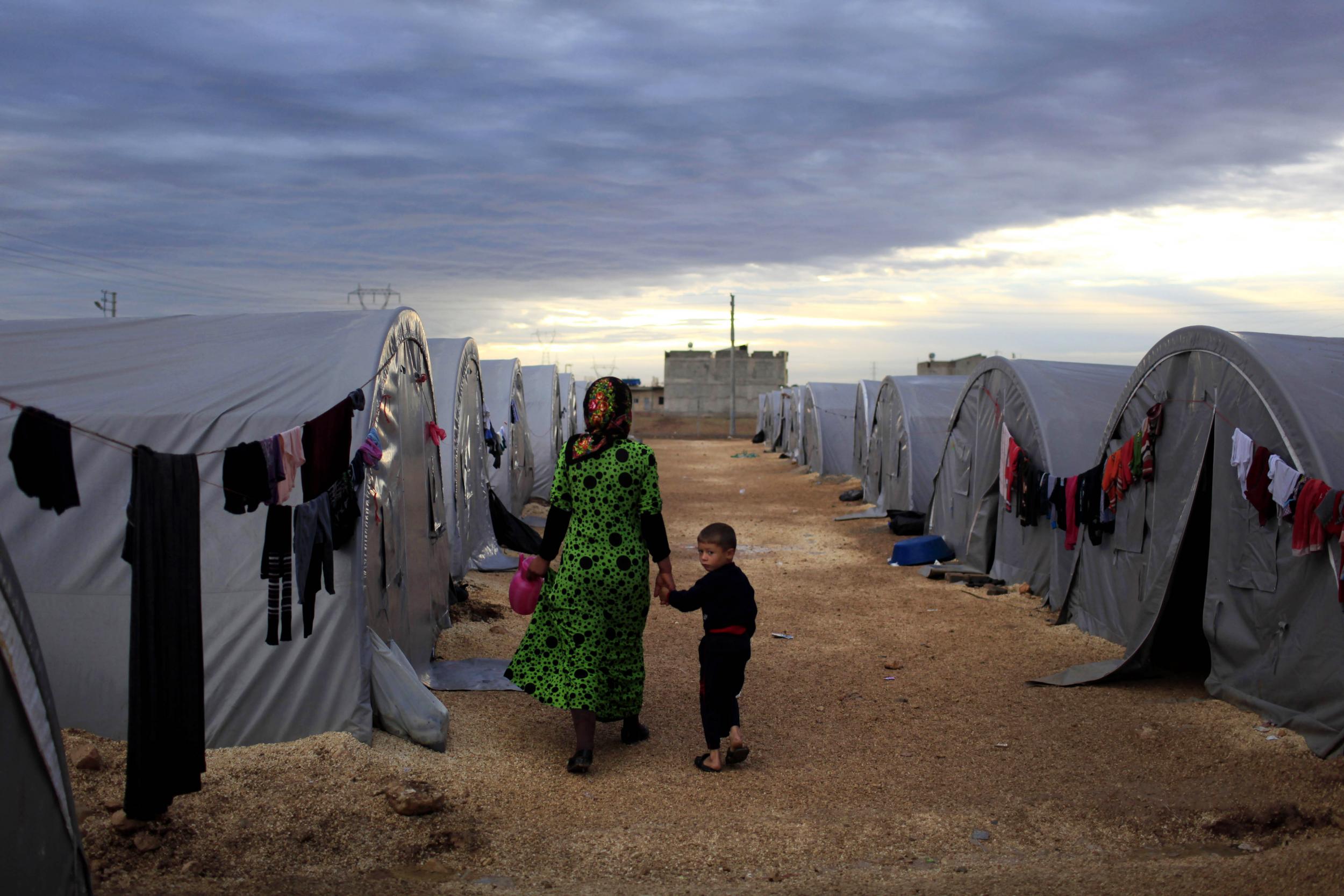Syrian refugees are returning home because they have no choice – there’s nothing ‘voluntary’ about it
As measures to prevent Covid-19 ravage the economies of already struggling host countries, there will be an uptick in forced retreats, writes Bel Trew


The camp is located in an arid and uninhabitable triangle of desert wedged between Iraq, southern Syria and Jordan.
This hellish corner of the world – known as Rukban – is positioned next to a sand barrier, or berm, and surrounded by armed factions or armies on all sides. According to those who live there, aid organisations have not been permitted to enter it for a year.
An estimated 10,000 displaced Syrians who fled war have been corralled into this no man’s land where they have to rely on charity to survive, says Ahmad Darbas, who was displaced from the historic city of Palmyra five years ago and is the camp chief.
And so he cannot understand why last month at least 16 Syrian refugees, including eight children, the youngest aged just four years old, were apparently forced to return from Jordan by the Jordanian authorities.
“It is a crime against humanity to force people back here,” he tells The Independent via WhatsApp, sending photos of squalid mud-brick homes and tents in a barren moonscape.
“It is also worrying for us. We do not have a place for quarantine, and are fearful the coronavirus will come from Jordan,” he adds.
Most of the residents of Rukban arrived in 2015, fleeing Syria’s civil war with the hope of escaping to Jordan, which eventually largely barred entry as it struggled with nearly 700,00 Syrian refugees. Five years on, those at Rukban lack access to sufficient and affordable food, clean water, medical care and sanitation, according to Amnesty International, which raised the alarm about the forcible transfers this week when the news came to light.
In a new report, they said that of the 16 who were apparently forcibly returned, one of the families said they were arrested at night at their refugee camp in Jordan and deported without being able to collect any of their belongings or money.
Amnesty was not able to speak to the other two families to determine whether their movements were voluntary or not. However, the rights group learned from camp residents that one of the families was so concerned by the dire conditions in Rukban that they immediately returned to regime-controlled parts of Syria, despite the grave risks.
The Independent was unable to independently verify this or reach the Jordanian authorities for comment.
But Amnesty said Jordan is not alone in sending refugees back to Syria, despite the fact that forcibly detaining and transferring refugees is a clear violation of their rights to liberty and to freedom of movement. It is also against their rights to an adequate standard of living and to health, particularly if it forces them to make tricky decisions like moving on to areas where their lives are at risk.
Rights groups, including Amnesty, are renewing calls for this to stop and for the international community to step up and offer resettlement places for Syrian refugees, as well as helping host countries to cope with the massive burden of housing and caring for refugees.
This is needed now more than ever.
As lockdowns lift and borders begin to reopen, there will likely be an uptick in forced returns of Syrian refugees after the pandemic, and measures to prevent Covid-19 have ravaged the economies of already struggling host countries.
“The narrative about Syria is that the war is over. There is a wrong perception that it is less dangerous there,” says Marie Forestier, Amnesty International’s researcher on refugee and migrant rights.
“[Looming] economic crises [along] with the pandemic [...] are all ingredients that might push countries to want to make Syrian refugees leave,” she says.
This has been happening in Turkey, which hosts the largest number of Syrians: nearly 4 million. As the civil war grinds on, many have described feeling increasingly unwelcome and concerned by dwindling economic opportunities.
In May, Amnesty documented cases of six Syrian men being deported from the central Turkish city of Konya to Idlib in Syria.
One of the six told Amnesty that the Turkish authorities forced them to sign documents stating they wanted to voluntarily return to Syria, which the rights group says is a “dangerous and illegal practice”.
They now fear for their lives in Syria.
Turkey has repeatedly denied forcible transfers of refugees in the past. Last year, however, Amnesty documented hundreds of Syrian refugees across Turkey being reportedly swept up, detained, and transported against their will to Syria.
There are also concerns for Lebanon, which hosts the largest number of refugees per capita in the world. Last year, Lebanon’s General Security agency announced that 172,046 refugees had returned to Syria since December 2017.
Rights groups fear that these returns were not truly voluntary because refugees were fleeing worsening conditions in Lebanon, including the inability to obtain healthcare, jobs and residency (three-quarters of Syrian refugees in Lebanon do not have legal status).
This has only become more acute with the recent economic collapse of Lebanon.
While many Syrians do want to return to Syria, they need to do so safely and only if they are in a position to make a free choice.
In the meantime, nations around the world should step in to help, rather than abandoning some of the world’s most vulnerable people in the middle of a pandemic.





Join our commenting forum
Join thought-provoking conversations, follow other Independent readers and see their replies
Comments